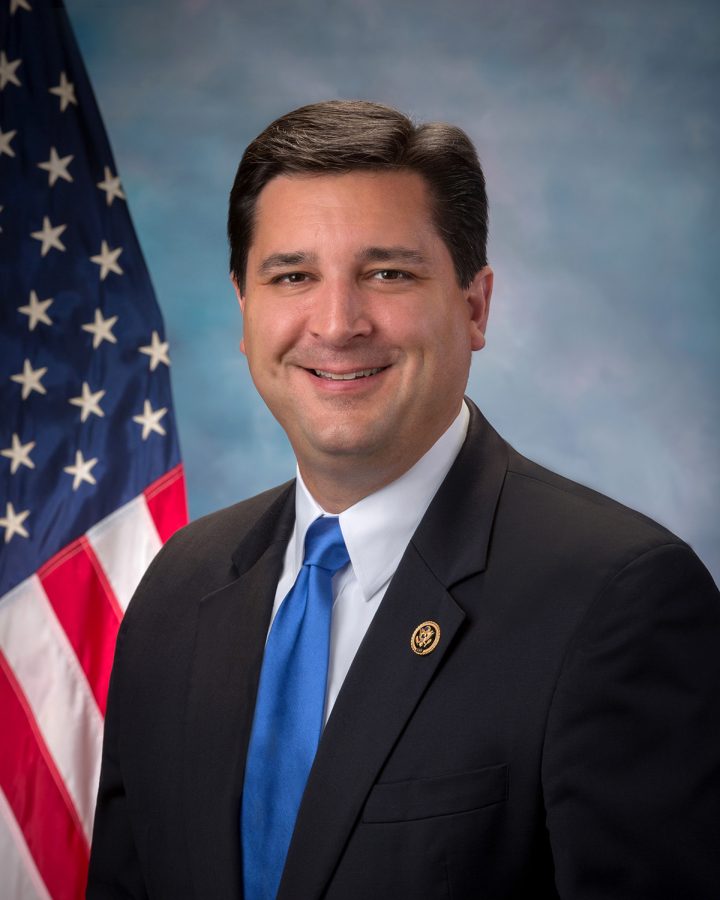OPINION: In defense of David Rouzer
U.S. Representative David Rouzer (R-NC07) has become a very controversial figure within his district. Since the November election of Joe Biden to the presidency, he has taken the results with a grain of salt and expressed concern over possible widespread voter fraud. Even as such fraud became quickly disproven in the months since, Rouzer has refused to acknowledge Biden as the winner. On Jan. 4, just before Congress met to certify the results of the Electoral College vote, the congressman announced he would object. Consequently, many on the left have called for his resignation, with some organizing impromptu caravan demonstrations in parts of the district.
The backlash is warranted, to an extent. When a mob of far-right Trump supporters stormed the Capitol Building Jan. 6 as Congress met to certify the former Vice President’s victory, experts swiftly linked to the violence misinformation about the election being stolen and the mob’s belief in that misinformation. Also, Rouzer has not directly condemned Trump for inciting the insurrection, a stance widely shared by many legal experts. The President was heard saying “we are going to walk down Pennsylvania Avenue, I love Pennsylvania Avenue, and we are going to the Capitol,” and “fight like hell.”

Photo by Samuel Corum – TNS
However, Rouzer did denounce the violence itself, and he denounced it immediately. At 4:44 p.m. on Jan. 6, the congressman took to Twitter to announce he was secure and condemn the mob. Trump, on the other hand, did not even try to condemn it for more than 24 hours after the fact. And when he did, he failed to admit his involvement in igniting the attack. As a result, he is facing his second impeachment, a first for an American president, and will face a Senate trial once Biden takes office. If convicted, Trump will be permanently barred from running for federal public office and will see his shrinking hopes at a successful 2024 run for the White House dashed for good.
Furthermore, objecting to Electoral College votes is not as rare or shocking as one may think. In 2017, when then-President-elect Trump’s win over Democrat Hillary Clinton was affirmed, seven House Democrats objected, citing widespread voter suppression. While this seems like valid grounds for objection, it is not in line with the Constitution, which holds states responsible for regulating the electoral process. In 2005, two Democrats, one from the House and the other from the Senate, objected to George W. Bush’s victory in Ohio; had they been successful, Democrat John F. Kerry would have won due to how narrow Bush’s Electoral College margin was. Congressional objections to election results are not common, but they are not rare either, and they are not exclusive to Trump supporters or Republicans as a whole.
Democrats should be careful what they wish for and not employ a double standard. If they want Rouzer (or any Republican member of Congress who objected to Biden’s win for that matter) to be forced to resign, they should also be prepared to enforce this policy on any Democratic objectors the next time a Republican wins the presidency. History tells us that following through may be hard for them, though, as a combined total of 31 active House and Senate Democrats have objected to past GOP wins in 2017, 2005, and even the 2010 midterm elections when Republicans won back the House and six of their 10 missing Senate seats required for majority rule.
Even if Rouzer does resign, North Carolina’s 7th District is almost certain to remain under GOP control. Special elections are held whenever a representative passes away or quits during his or her term. As a result of gerrymandering, or the redrawing of congressional districts by political parties to boost their presence in the House, NC-07 has a very conservative electorate. FiveThirtyEight’s 2020 House election forecast gave Rouzer a greater than 99 out of 100 chance at victory, with a projected popular vote north of 60%. In the event of a special election, the odds would be very similar even with Rouzer off the ballot.

Photo by Tasos Katopodis – TNS
Many of the grievances from Southeastern North Carolina’s left are more or less about the larger issue of gerrymandering than Rouzer himself. This practice is unfair and must be changed; the Associated Press (AP) found in 2017 that states skewed in favor of Republicans outnumbered those favoring Democrats four to one. AP also learned six key presidential battleground states from Pennsylvania to Florida were all divided by Republicans following the 2010 census. This biased districting has resulted in the GOP winning an estimated additional 22 House seats than what would have been expected from election results in counties and states nationwide.
North Carolina is also on the list of AP’s heavy Republican battlegrounds. This finding resonates with Democratic Wilmingtonians in the 7th district calling for Rouzer to step down. The state’s 11th is perhaps an even stronger example: it is home to progressive stronghold Asheville but also is led by a Republican, David Madison Cawthorn. The response from the Democrats there is the same as in NC-07: resign.
But what these liberals do not seem to understand here is that fixing the corrupt system of gerrymandering needs to be done at the national level and will take lots of time, most likely on the order of several years to decades. This process will require more than just feel-good measures like swiftly replacing one House Republican with another. Instead, it will require signing petitions, increasing education and involvement in politics and elections, and relentlessly nudging reform bills through the federal government, no matter how difficult that lattermost step may be. And on the day these changes succeed, the entire nation, not just certain cities in a few battleground states, will reap the rewards. But right now, Rep. Rouzer should not resign or bow to Democratic pressure to do so.













Wil • Nov 1, 2022 at 3:24 pm
I found it odd that when I wrote Rouzer and ask him if he was a Trump supporter I recieved a robot response that read like this….
“Dear Friend,
Thank you for contacting me and taking the time to share your thoughts on this important matter.
I appreciate you patience as I carefully review each message. I simply wanted you to know that your opinion has been noted and your voice has been heard.
It is a great honor to serve as your Representative in Congress. I am humbled to take on this responsibility and look forward to serving our great state and Nation. To better stay in touch, please sign up to receive my e-newsletter through my website.
Sincerely,
David Rouzer
Member of Congress”
He never addressed the question I asked although his response says
“I carefully review each message”
I tried again and no response, I tried a third time, and no response. I asked a friend to do the same and they received the same email response, word for word. It seems he will not answer the people he represents……….sad state of affairs in todays politics.